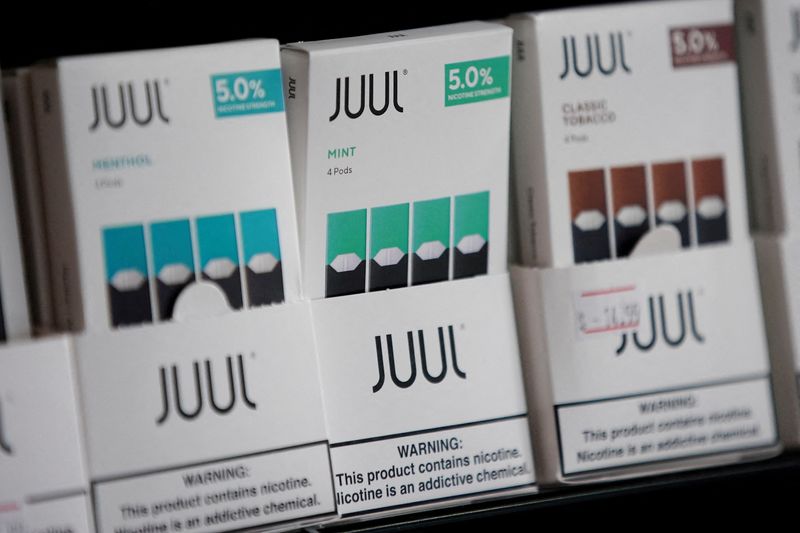Juul’s checkered e-cigarette journey cut short by FDA ban
2022.06.24 20:36

FILE PHOTO: Juul brand vape cartridges are pictured for sale at a shop in Atlanta, Georgia, U.S., September 26, 2019. REUTERS/Elijah Nouvelage
(Reuters) – The U.S. Food and Drug Administration ordered Juul Labs Inc to stop selling its e-cigarettes in the United States on Thursday, saying the company’s data “lacked sufficient evidence” to show its products would be appropriate for the protection of public health.
The following are significant events in the checkered history of Juul Labs, which started under the name of Ploom Inc:
Date/Year Event
2007 Product Design graduates of Stanford University,
James Monsees and Adam Bowen, found Ploom Inc,
drawing from their thesis project on a new kind
of cigarette.
2012 Ploom introduces a line of vaporizers called
Pax, designed to heat up loose-leaf tobacco but
instead became enormously popular as discreet
devices for using cannabis.
2015 Ploom becomes Pax Labs after selling the rights
of its products to Japan Tobacco (OTC:JAPAF) International,
an investor in the company.
2015 Pax Labs introduces Juul e-cigarette.
2017 Pax Labs spins out into a separate company,
leaving Juul Labs to focus on nicotine
e-cigarettes.
Dec. 2017 Juul names former Chobani executive Kevin Burns
as its new chief executive.
April 2018 The U.S. Food and Drug Administration says it
has conducted an investigation of underage sales
of Juul products and writes to Juul requesting
documents around the marketing of its products.
April 2018 Juul announces it will take more decisive action
by supporting state and federal push to raise
the minimum age to 21+ to purchase tobacco
products.
Sept. 2018 Then-FDA Commissioner Scott Gottlieb calls
teenage vaping an “epidemic,” tells Juul and
other e-cigarette makers they have 60 days to
submit plans on ways to combat youth use.
Nov. 2018 Juul announces plans to pull all flavors from
over 90,000 retail stores except tobacco, mint
and menthol; the FDA says it will craft similar
regulations around those flavors. (https://reut.rs/3yd7xTj)
Dec. 2018 Tobacco giant Altria Group (NYSE:MO) invests $12.8 billion
in Juul, taking a 35% stake in Juul and valuing
the company at $38 billion. (https://reut.rs/3HMAZms)
Sept. 9, The FDA sends warning letter to Juul CEO over
2019 its unproven claims that its products pose less
harm than traditional cigarettes.
Sept. 11, Trump administration says it will ban the sale
2019 of most flavored e-cigarettes.
Sept. 25, CEO Kevin Burns steps down. Juul names former
2019 Altria executive KC Crosthwaite as CEO. Also
suspends all advertising in the U.S. and says it
will refrain from lobbying the Trump
administration. (https://reut.rs/3xSpFR0)(https://reut.rs/3zY5SCp)
Oct. 17, Juul suspends sale of its non-tobacco,
2019 non-menthol-based flavors Mango, Creme, Fruit
and Cucumber in the United States pending FDA
review. (https://reut.rs/3OFYEHD)
Oct. 31, Altria says it is writing down its investment in
2019 Juul by $4.5 billion, citing regulatory risks.
(https://reut.rs/3bmGxbk)
Nov. 12, Juul to cut nearly $1 billion in costs next
2019 year. (https://reut.rs/3NfoGjI)
Nov. 19, The state of California sues Juul, alleging the
2019 San Francisco company engaged in a “systematic”
and “wildly successful” campaign to woo
teenagers to its nicotine devices. (https://reut.rs/3HTgXGX)
Jan. 2, Trump administration bans some popular
2020 e-cigarette flavors including fruit and mint,
allowing only menthol and tobacco flavors to
remain on the market. (https://reut.rs/3bpKkEs)
Jan. 20, Altria takes a $4 billion charge on its
2020 investment in Juul, bringing down the value of
its investment to $4.2 billion as of the end of
2019. (https://reut.rs/3bh7flv)
Feb. 21, The U.S. Securities and Exchange Commission
2020 probes Altria’s investment in Juul. (https://reut.rs/3ncaPQM)
March 12, Juul announces co-founder James Monsees to leave
2020 the e-cigarette maker, stepping down as adviser
and board member. (https://reut.rs/3yeQpg6)
April 1, The U.S. Federal Trade Commission files a
2020 complaint to force Altria to sell its investment
in e-cigarette maker Juul. (https://reut.rs/3HMuT5y)
July 30, Juul Labs submits a Premarket Tobacco Product
2020 Application to the FDA for its JUUL System, an
electronic nicotine delivery system. (https://reut.rs/3bmzwqG)
Aug. 18, The FDA files Juul’s PMTA for substantive
2020 review.
Sept. 3, Juul says it will cut global workforce
2020 significantly and consider pulling out of some
European and Asia-Pacific markets. (https://reut.rs/3nctiwq)
Oct. 29, Juul cut its valuation to about $10 billion from
2020 $12 billion at the end of last year as it faces
regulatory scrutiny. (https://reut.rs/3bfVNq9)
Oct. 30, Altria takes another hit of $2.6 billion to its
2020 investment in Juul. Its stake is now worth $1.6
billion. (https://reut.rs/3QJxy3W)
Sept. 9, The FDA says it needs more time to decide if
2021 e-cigarette maker Juul and other major
manufacturers can sell products in the United
States.
Feb. 15, A judge at the FTC dismisses a complaint that
2022 the agency filed aimed at requiring Altria to
sell a minority investment in Juul.
April 28, The FDA issues a proposal to ban menthol
2022 cigarettes and flavored cigars, a year after the
agency announced the plan.
June 22, Wall Street Journal reports the FDA is preparing
2022 to order Juul to take its e-cigarettes off the
U.S. market.
June 23, The FDA blocks Juul from selling its nicotine
2022 products in the United States, after a nearly
two-year-long review of data submitted by the
company.
June 24, Juul asks a federal appeals court to temporarily
2022 block the FDA’s order to stop selling its
e-cigarettes in the United States, according to
a filing with the U.S. Court of Appeals for the
D.C. Circuit.








